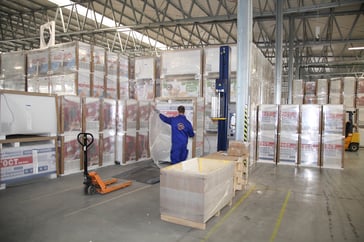 There are many types of business models commonly utilized. Two business models that get a lot of focus are B2B and B2C models. B2B, which stands for business to business, is a model in which businesses sell products or services to other businesses. The second model is B2C, in which businesses sell products or services directly to consumers. These two business models seem clear in terms of the differences between them. Yet there is a third business model that is growing in popularity for manufacturers that allows typically B2B operations to have direct access to consumers. This business model is called B2B2C.
There are many types of business models commonly utilized. Two business models that get a lot of focus are B2B and B2C models. B2B, which stands for business to business, is a model in which businesses sell products or services to other businesses. The second model is B2C, in which businesses sell products or services directly to consumers. These two business models seem clear in terms of the differences between them. Yet there is a third business model that is growing in popularity for manufacturers that allows typically B2B operations to have direct access to consumers. This business model is called B2B2C.
What is a B2B2C model? According to FourWeekMBA.com “a B2B2C is a particular kind of business model where a company, rather than accessing the consumer market directly, does so via another business. Yet the final consumers will recognize the brand or the service provided by the B2B2C. The company offering the service might gain direct access to consumers over time.”
Most manufacturers are very comfortable operating in the B2B business model and there are many advantages to selling as a B2B company. But there are distinct advantages to B2B2C that can help a manufacturing operation grow.
Better Customer Data
Manufacturers in a B2B2C model have direct access to customer data, as opposed to limited or filtered access to data from the business they sell their products to. The ability to review customer data firsthand allows manufacturers to manage customer needs and expectations. As a result, they can then respond quickly to changes needed in product production and quality assessments to meet those needs and expectations.
Brand Control
Direct customer data access can also improve upon marketing initiatives. By knowing who the customer is, marketing is more focused and targeted. In addition, the brand can be controlled by the manufacturer rather than the distributor, which means more authenticity and transparency for the customer.
Growth

When manufacturers control the entirety of the manufacturing process, the price can be controlled. MSRP is managed entirely by the manufacturer and this translates to a savings in costs which can lead to savings for the product consumer. It also means a boost in sales for the manufacturer and an increase in profits.
Fully Manage the Supply Chain
The ability to meet increased demand by fully managing the supply chain is another way that manufacturers can benefit from a B2B2C model. When you oversee the manufacturing process as well as the distribution process you can manage what happens throughout the entire cycle of production. There are no third parties involved. The customer will benefit from availability and decreased costs as a result.
By turning to a B2B2C model, manufacturers can improve their growth potential, profitability, and customer connection to the products produced. These things lead to positive outcomes for both the manufacturer and the end user.
To learn how Radwell can support your manufacturing operation
To join Radwell Automation Nation, listen to Radwell's Podcast


